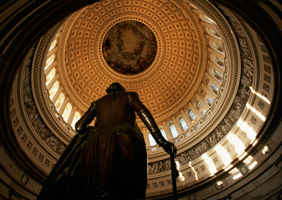Newsroom
Lawmakers, NAFCU stress need for digital currency oversight
 Members of the Senate Banking Committee Tuesday sought to understand how Facebook would ensure that its proposed cryptocurrency – Libra – would comply with laws and regulations, specifically related to the Bank Secrecy Act (BSA)/anti-money laundering (AML) regime and data protection and privacy. Ahead of the hearing, NAFCU's Max Virkus raised similar concerns.
Members of the Senate Banking Committee Tuesday sought to understand how Facebook would ensure that its proposed cryptocurrency – Libra – would comply with laws and regulations, specifically related to the Bank Secrecy Act (BSA)/anti-money laundering (AML) regime and data protection and privacy. Ahead of the hearing, NAFCU's Max Virkus raised similar concerns.
"NAFCU is supportive of innovation in the marketplace, but we want to ensure that we maintain a strong and safe financial ecosystem," wrote Virkus, NAFCU's associate director of legislative affairs. He noted that BSA/AML regulations "have only just begun to adapt to the realities of cryptocurrency-based exchange" and that a new player in the financial services space might not have the same culture of compliance as experienced financial institutions.
Virkus also reiterated NAFCU's call for "a national data security standard for entities that collect and store consumers' personal and financial information that are not already subject to the same stringent requirements as depository institutions," especially as states begin to adopt a patchwork of consumer privacy standards.
The committee heard from David Marcus, head of Facebook's subsidiary Calibra, which is creating Libra. Marcus described Libra's mission as "developing a secure, low-cost way for people move money efficiently around the world." He also indicated Calibra's commitment to working with state, federal and international regulators to ensure all oversight concerns are addressed prior to the product's launch.
Senate Banking Committee Chairman Mike Crapo, R-Idaho, noted that Facebook's currency could help reach unbanked communities as most people have mobile phones. NAFCU acknowledges the benefits fintech can bring to the financial services industry, but has urged lawmakers to ensure those companies are appropriately regulated.
Throughout the hearing, Marcus explained how Libra would work as a blockchain platform rather than a bank, and in terms of protecting consumers' money and being interoperable with other digital wallets. Libra isn't a bitcoin but rather a "stablecoin," which is tied to real-world currency, and Marcus explained how it will be different from existing stablecoins. NAFCU is a member of two blockchain efforts and has worked to ensure credit unions' perspectives are considered as use cases are developed.
A number of lawmakers also flagged Facebook's abuse of consumer trust and privacy. While Libra is being developed by Facebook, Marcus said it will not be controlled by the company and will have competition to maintain its integrity. He said Facebook is pursuing this project because it has the ability and means and believes the U.S. should be a global leader in setting "rules of the road" for financial innovation.
Marcus is set to testify again today before the House Financial Services Committee; NAFCU's Virkus again flagged NAFCU's regulatory and data security concerns ahead of the hearing. The hearing is scheduled to begin at 10 a.m. Eastern and will also include a second panel of issue experts.
Share This
Related Resources
Data Privacy Issue Brief
Whitepapers
Data Privacy Issue Brief
Whitepapers
NAFCU Data Privacy Principles
Whitepapers
Compliance Monitor - August 2018
Newsletter
Get daily updates.
Subscribe to NAFCU today.
